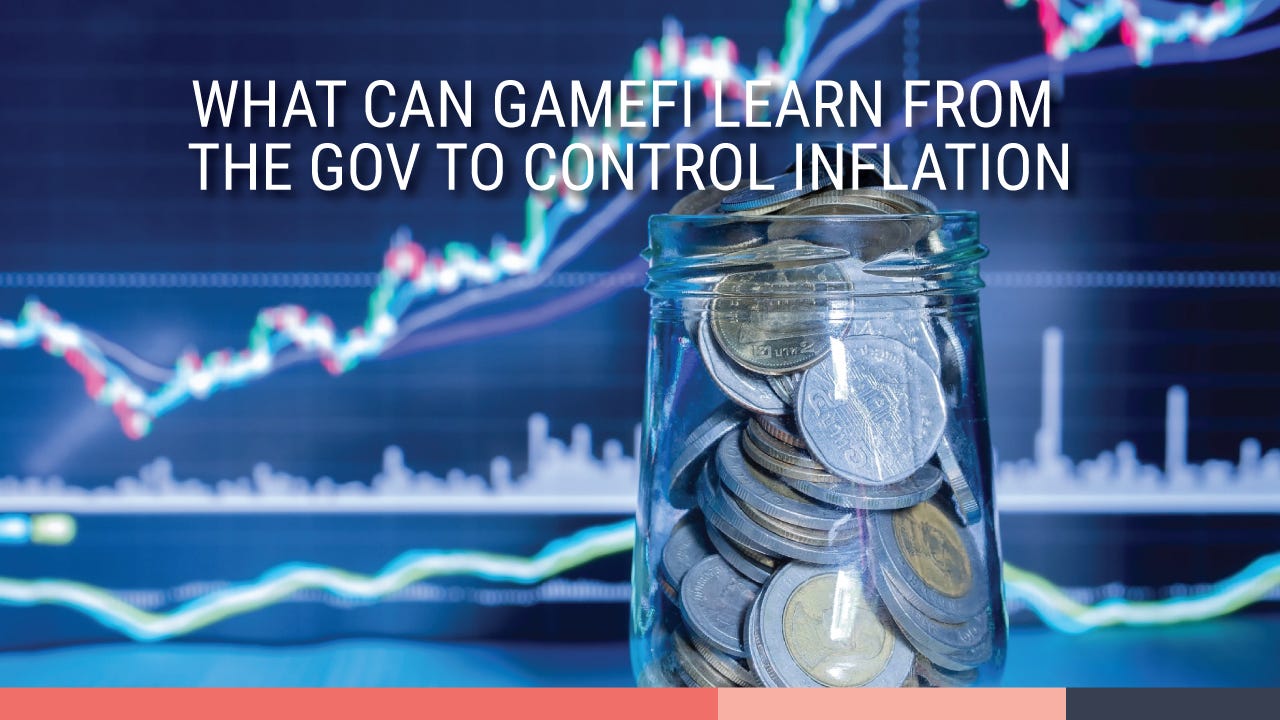What can GameFi learn from the gov to control inflation
Economics Design
Welcome, subscribers! Thank you for subscribing. What will be shared today and the days ahead are alpha from our Economics Design's researchers. Please keep these mails secret and do not share them with any one because these alpha are confidential. Enjoy your reading.TLDR: When injecting fresh liquidity, you could trigger an inflationary pressure, especially when the tokens are currently not being used for value creation. So you need to find a way to reduce the inflationary impact.
3 Steps to Reduce Inflationary Impact
How can you do this? 3 steps.
Lock up tokens so it does not increase the total available and liquid circulating quantity of tokens.
You can either increase staking reasons or you increase the unlocking period of the staked tokens. Both are to decrease the available and liquid supply of tokens.
Then, inject fresh liquidity to areas that require liquidity for value creation. You would not have the effect of liquidation from staked tokens, to compete with the fresh liquidity to create inflationary pressure.
Why do this
Your goal as an economist or ecosystem designer is create healthy balance of inflationary and deflationary factors. Inflation comes from value creation, deflation comes from value realisation.
Lessons Learnt from China’s Real Estate Market
Current situation
Inflation and recession are both here, which results in a negative macro impact on the nation. As a government, what can you do? You can increase gov stimulation, which is increase money in the system to encourage people to spend. But there is a problem! Doing too much of that will worsen the current inflationary pressure, which means people will find it hard to afford things. This is due to the many rounds of gov stimulation during covid to boost local demand. So what can we do? Find ways to reduce capital and cash in the market through capital sinks or lock ups. Then when fresh money is injected into the system, this impacts the current inflation less.
Top down approach: Gov Policy
Reduce credit to real estate market in China. This is evident as lenders (e.g. banks) are tightening) their mortgage lending requirements to home buyers. Specifically, HELOC — home equity line of credit. That means loaning (leverage loan) the second time based on your property. This increases available money for people, but if the government wants to target specific industries, there needs to be less available cash readily available for loan by users, to use it however they want.
Outcomes (top down): This results in less liquidity from the real estate industry. Meaning if you own real estate and you want cash, you need to sell it at a massive discount because there are less buyers available (due to tightening requirements by lenders) and more sellers (due to the inability to leverage as easily).
Real estate is a medium for intergenerational wealth transfer (as in an investment, not currently used for this period’s consumption except for maybe rent yields at 2.1% pa. Source. And dropping per year due to slow population growth). 70% of household wealth is in property. Investing in real estate “locks in” savings in this asset class (i.e., cash sink in this system). This available funds cannot be used for “value creation”, as in current consumption.
What does this mean? You need manage inflation.
What Else Did You Miss?
Other considerations (bottom up)
Relevance to crypto
Crypto considerations
Get premium access to unlock more content



I have an active premium subscription but can't read the premium content on this article. Why is that?